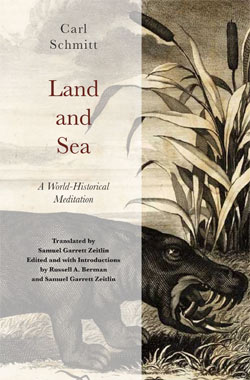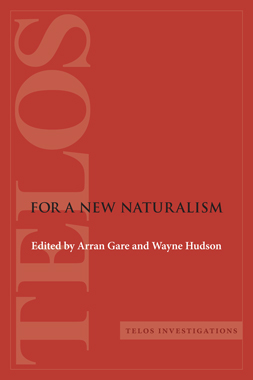By Telos Press · Wednesday, September 6, 2017 In a new review essay in Thesis Eleven, Peter Murphy writes about Carl Schmitt’s Land and Sea: A World-Historical Meditation, translated into English by Samuel Garrett Zeitlin and published by Telos Press Publishing. Purchase your copy of Schmitt’s Land and Sea in our online store and save 20% by using the coupon code BOOKS20.
An excerpt from the review:
 Samuel Zeitlin’s adroit, elegant translation of Carl Schmitt’s Land and Sea is sparkling to read. The book moves along with great energy, vibrant economy, and penetrating succinctness. The translation deftly conveys a book that is as short and direct as it is world-historical in scope. Its inquisitive reach expands as its flinty prose shrinks to the point of pithy, terse deliberateness. In 100-odd crisp pages it moves with panoptic concision from the ‘Potamic’ river cultures of the Middle East to the inland sea of the Mediterranean and across the oceans of modernity. The volume is beautifully produced by Telos Press. Samuel Zeitlin’s adroit, elegant translation of Carl Schmitt’s Land and Sea is sparkling to read. The book moves along with great energy, vibrant economy, and penetrating succinctness. The translation deftly conveys a book that is as short and direct as it is world-historical in scope. Its inquisitive reach expands as its flinty prose shrinks to the point of pithy, terse deliberateness. In 100-odd crisp pages it moves with panoptic concision from the ‘Potamic’ river cultures of the Middle East to the inland sea of the Mediterranean and across the oceans of modernity. The volume is beautifully produced by Telos Press.
Continue reading →
By Telos Press · Friday, September 1, 2017 Telos Investigations is a new book series that collects papers delivered at Telos-Paul Piccone Institute conferences. The first volume in the series, For a New Naturalism, edited by Arran Gare and Wayne Hudson, is now available for purchase in our online store. Save 20% on the list price by using the coupon code BOOKS20 during the checkout process.
 Western civilization has been afflicted by a divide between the sciences and the humanities, a divide that has been harmful to both. The first volume in our new Telos Investigations series, For A New Naturalism elaborates the implications of recent developments in natural philosophy that challenge both Cartesian dualism and reductionism. The contributors to this volume write from a variety of political, philosophical, and scientific standpoints. They all agree, however, that a civilization based on reductionist naturalism, with its impoverished understanding of both human life and the universe, is failing to generate the political and social thought we need. And they all support the need for a wider naturalism than the objectivating naturalism that emerged in seventeenth-century Europe. In addressing the contested status of naturalism in contemporary philosophy, the contributions to this volume question both prevailing assumptions about nature and assumptions about what is knowledge. They argue for a new alliance between science and the humanities, and spell out some of the implications of this challenge for philosophy, society, and religion. Western civilization has been afflicted by a divide between the sciences and the humanities, a divide that has been harmful to both. The first volume in our new Telos Investigations series, For A New Naturalism elaborates the implications of recent developments in natural philosophy that challenge both Cartesian dualism and reductionism. The contributors to this volume write from a variety of political, philosophical, and scientific standpoints. They all agree, however, that a civilization based on reductionist naturalism, with its impoverished understanding of both human life and the universe, is failing to generate the political and social thought we need. And they all support the need for a wider naturalism than the objectivating naturalism that emerged in seventeenth-century Europe. In addressing the contested status of naturalism in contemporary philosophy, the contributions to this volume question both prevailing assumptions about nature and assumptions about what is knowledge. They argue for a new alliance between science and the humanities, and spell out some of the implications of this challenge for philosophy, society, and religion.
Continue reading →
By Ellen Hinsey · Thursday, July 13, 2017 In the wake of the Brexit vote and the 2016 American presidential election, the idea began to circulate that we were witnessing a trans-Atlantic, populist “revolt against the elites,” which had spontaneously arisen from populations whose concerns had, for too long, gone unheard by those in power. Longstanding economic problems regarding income disparity and wealth—left unaddressed by both sides of the political spectrum—are indeed among the most pressing issues that we currently face. But as has been observed, the first half-year of the new U.S. presidential administration, with one of the wealthiest cabinets in American history, calls into question the validity of the “populist” interpretation in the U.S. context. The failure of this theory has in turn exposed a gap in our ability to conceptualize what actually happened during the U.S. election, what is unfolding before us, and how we got here.
Continue reading →
By Mitchell Dean · Wednesday, July 12, 2017 This paper takes its initial inspiration from Carl Schmitt’s claim in 1927 that the “original democratic phenomenon . . . is acclamation,” and draws upon the interchange between religious and political forms of acclamation observed by Ernst Hartwig Kantorowicz and Erik Peterson and elaborated recently by Giorgio Agamben. If Schmitt is correct, then acclamation is central to the construction of “the people” who by definition are the source of political legitimacy. What is required then is what I have called an “analytics of publicity” that would study the different ways in which the public is formed through different forms of acclamation.
Continue reading →
By Flaminia Incecchi · Monday, July 3, 2017 In “Values or Virtues, Nietzsche or Aristotle?” Jay Gupta outlines the way that value discourse stifles normative intention and the ethical imagination. The aim of the paper is to “suggest that the language of values disguises a deeper, normatively richer language of virtue, and . . . point[s] to the importance of recovering that language in the modern age, as well as the difficulties that must attend such a recovery.” Before exploring the merits of the article, I wish to offer a few clarificatory notes. Recently, there has been a conspicuous number of thinkers that have advocated a return to virtue ethics. Perhaps the most notable among these is Elizabeth Anscombe, who, with the paper “Modern Moral Philosophy,” uncovers the supposed banality of modern moral philosophy and points to the ways in which moral discourse has retained elements of the Christian ethical tradition.
Continue reading →
By Michael Marder · Friday, June 16, 2017 Critique of phenomenology amounts to a tiny piece of the puzzle that is Gianni Vattimo and Santiago Zabala’s thought-provoking Hermeneutic Communism: From Heidegger to Marx. According to the spot allocated to it, phenomenology fits in with the other manifestations of classical metaphysics, bent on preserving the transcendental privilege of immutable truth. In what follows, I will argue that such placement may not do justice to phenomenology, which, in its most critical manifestations, is an ally of hermeneutic communism. This particular piece of the puzzle belongs on the other side of the intellectual and historical barricades, and, more importantly, holds the potential for mediating between the various opposed camps—description and interpretation, realism and anti-realism, the strong and the weak, metaphysics and postmetaphysics—that Vattimo and Zabala keep apart.
Continue reading →
|
|
Samuel Zeitlin’s adroit, elegant translation of Carl Schmitt’s Land and Sea is sparkling to read. The book moves along with great energy, vibrant economy, and penetrating succinctness. The translation deftly conveys a book that is as short and direct as it is world-historical in scope. Its inquisitive reach expands as its flinty prose shrinks to the point of pithy, terse deliberateness. In 100-odd crisp pages it moves with panoptic concision from the ‘Potamic’ river cultures of the Middle East to the inland sea of the Mediterranean and across the oceans of modernity. The volume is beautifully produced by Telos Press.



